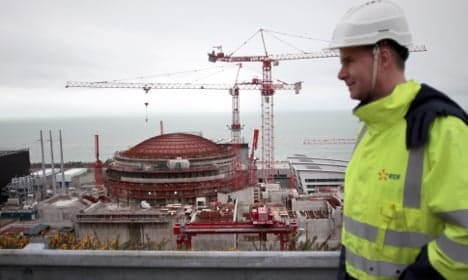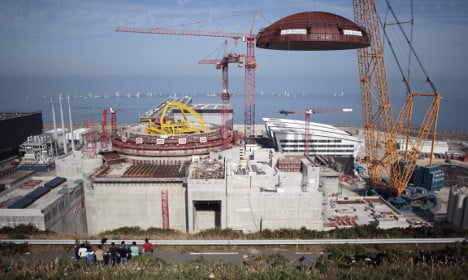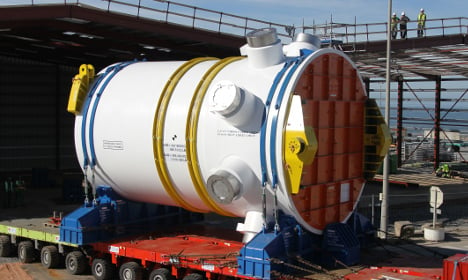Flagship French nuclear reactor hits another snag

France's world renowned prowess in the nuclear power industry has taken another blow after officials announced this week, yet another delay to the launch of its next generation reactor, that is fast becoming a costly calamity.
French energy group EDF on Thursday announced a further delay to the launch of its next generation EPR nuclear reactor, another setback for its €10.5-billion ($11.6 billion) project.
The launch is now set for "the fourth quarter of 2018," said EDF CEO Jean-Bernard Levy, of the showcase project being built with atomic energy giant Areva which has faced fresh technical problems in the past few months.
Levy was adamant that the delay would not affect the controversial plans to build two new EPR reactors at Hinkley Point in the UK.
"I have reviewed the Flamanville EPR project in detail, and I am absolutely confident that it will be a success," Levy said.
"It is a priority for EDF and of critical importance for the French nuclear industry and its success internationally.
"All of the experience gained at Flamanville will be invaluable for other EPR projects, such as Hinkley Point. Together with renewable energies, new nuclear build is an asset for successful energy transition to which EDF is fully committed."
It's the fourth time EDF (Electricite de France) has had to push back the delivery date of the European Pressurised Reactor (EPR), a third-generation reactor design considered the most advanced and safest in the world.
The project in Flamanville in northwest France, which began construction in 2007, was set to be the first EPR reactor to go on line, but now it appears that could be achieved at the Taishan nuclear reactor in southern China.
Another EPR project in Finland, involving Areva and German engineering group Siemens, has also been plagued with delays and cost overruns. It is set to begin the testing phase in 2016 and start operations in 2018.
SEE ALSO: France's nuclear calamity has UK worried

Levy put China's racing ahead to be first with an EPR reactor down to differences in nuclear security regulations as well as building and labour practices.
China, which started construction in 2009, has also "greatly benefitted from the experience at Flamanville", which has allowed it "to avoid some of the glitches," said Xavier Ursat, director of engineering and new nuclear projects at EDF.
Flamanville was originally set for delivery in 2012 at a budget of €3.3 billion . The latest setback leaves the estimated cost at €10.5 billion.
"The cost of the first model is always higher," said Levy.

(The steel vessel, in which anomalies have been found arrives at the site. Photo: AFP)
He also stressed that EDF and Areva remain confident of the reactor, which is "vital" for France's electricity network and can help the renewal of the country's vast nuclear energy sector.
France is the most nuclear-dependent country in the world, and the second-biggest producer of nuclear energy with 58 reactors located in 19 power stations.
The delay and increased cost overruns sent EDF shares tumbling 2.24 percent Thursday to close at €18.290 on the Paris bourse.
Comments
See Also
French energy group EDF on Thursday announced a further delay to the launch of its next generation EPR nuclear reactor, another setback for its €10.5-billion ($11.6 billion) project.
The launch is now set for "the fourth quarter of 2018," said EDF CEO Jean-Bernard Levy, of the showcase project being built with atomic energy giant Areva which has faced fresh technical problems in the past few months.
Levy was adamant that the delay would not affect the controversial plans to build two new EPR reactors at Hinkley Point in the UK.
"I have reviewed the Flamanville EPR project in detail, and I am absolutely confident that it will be a success," Levy said.
"It is a priority for EDF and of critical importance for the French nuclear industry and its success internationally.
"All of the experience gained at Flamanville will be invaluable for other EPR projects, such as Hinkley Point. Together with renewable energies, new nuclear build is an asset for successful energy transition to which EDF is fully committed."
It's the fourth time EDF (Electricite de France) has had to push back the delivery date of the European Pressurised Reactor (EPR), a third-generation reactor design considered the most advanced and safest in the world.
The project in Flamanville in northwest France, which began construction in 2007, was set to be the first EPR reactor to go on line, but now it appears that could be achieved at the Taishan nuclear reactor in southern China.
Another EPR project in Finland, involving Areva and German engineering group Siemens, has also been plagued with delays and cost overruns. It is set to begin the testing phase in 2016 and start operations in 2018.
SEE ALSO: France's nuclear calamity has UK worried

Levy put China's racing ahead to be first with an EPR reactor down to differences in nuclear security regulations as well as building and labour practices.
China, which started construction in 2009, has also "greatly benefitted from the experience at Flamanville", which has allowed it "to avoid some of the glitches," said Xavier Ursat, director of engineering and new nuclear projects at EDF.
Flamanville was originally set for delivery in 2012 at a budget of €3.3 billion . The latest setback leaves the estimated cost at €10.5 billion.
"The cost of the first model is always higher," said Levy.

(The steel vessel, in which anomalies have been found arrives at the site. Photo: AFP)
He also stressed that EDF and Areva remain confident of the reactor, which is "vital" for France's electricity network and can help the renewal of the country's vast nuclear energy sector.
France is the most nuclear-dependent country in the world, and the second-biggest producer of nuclear energy with 58 reactors located in 19 power stations.
The delay and increased cost overruns sent EDF shares tumbling 2.24 percent Thursday to close at €18.290 on the Paris bourse.
Join the conversation in our comments section below. Share your own views and experience and if you have a question or suggestion for our journalists then email us at [email protected].
Please keep comments civil, constructive and on topic – and make sure to read our terms of use before getting involved.
Please log in here to leave a comment.